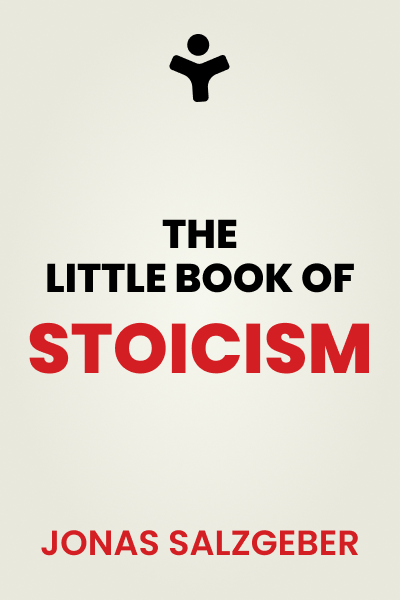
The Little Book of Stoicism: Timeless Wisdom to Gain Resilience, Confidence, and Calmness
by Jonas SalzgeberWhatever you’re going through in life, there’s advice from the Stoics that can help. Despite the philosophy’s age, its wisdom often feels surprisingly modern and fresh. It can help you build stamina and strength for your challenging life. It can help you become emotionally resilient, so you’ll neither get jerked around by outside events nor will others be able to push your buttons. It can teach you to handle yourself and stay calm during a storm. It can help you make decisions and, therefore, drastically simplify everyday living.
The Stoic Happiness Triangle
“The blazing fire makes flames and brightness out of everything thrown into it.” - Marcus Aurelius
There are three key principles of Stoicism. The first one is to live with arete, or express your highest self, the highest good. This is when you fully live in harmony with your values. The second one states that external circumstances are not important for the good life because they are not under our control. The only thing we can control is our mind.
However, living with arete or focusing on what we can control alone is not enough for the good life. This leads to the third principle, which is to take responsibility. We are the only ones responsible for whether we live a good life or not.
Here’s a detailed explanation of each principle:
Live with arete: Express your highest self in every moment. If we want to be on good terms with our highest self, we need to close the gap between what we’re capable of and what we’re doing. This is really about being your best version here and now. It’s about using reason in your actions and living in harmony with deep values.
Focus on what you control: This is the most prominent principle in Stoicism. At all times, we need to focus on the things we can control and take the rest as it comes. What is already there has to be accepted because it’s beyond our power to undo it. What is beyond our power is ultimately not important for our flourishing. Whether we flourish or not depends on what we choose to do with the given external circumstances. So regardless of the situation, we can always make the best out of it and live in harmony with our ideal self.
Take responsibility: Good and bad come solely from yourself. Every external event you don’t control offers an area you can control: how you choose to respond to this event. This is crucial in Stoicism, as it’s not events that make us happy or miserable, but our interpretation of those events.
Preparing Practices
“If we resist what happens, then we get dragged behind [...]. That’s called suffering.”
Stoicism is demanding. It wants you to express your highest self at all times. It wants you to focus on what you can control and accept the rest with equanimity. It wants you to recognize your power to perceive events in constructive ways. Most importantly, it wants you to take responsibility for your own flourishing.
If you keep these in mind while practicing Stoicism in real life, you can easily face the challenges life throws at you.
Actions to take
Challenging Life Situations
“When life is going smoothly, it’s easy to live by the Stoic principles. It’s when life kicks and punches you it gets much harder.”
Life doesn’t go smoothly. It’s meant to be challenging, and it’ll throw nasty stuff at you. Someone important to you may pass away, or you could lose your job, fall sick, face critical life decisions, etc.
To put it simply, it often seems like everything is working against you. However, it’s not what happens to us but our reactions to it that matter. We get disturbed not by the event itself but by our interpretation of the event.
These challenging situations are when our peace of mind is truly tested.
Actions to take
Situations with Other People
“Remember, we should treat other people as relatives as we’re all citizens of the same world. We must contribute some service to the community. We’re social because we cannot exist without one another. And doing good to others benefits ourselves first and foremost.”
Every day, there’s at least one annoying person who tries to push your buttons. It could be that reckless driver, the barefaced secretary, the mindless skater body, or the nagging little brother. It’s impossible to get rid of these people because they’re part of our life. We work with people. We have family and friends. Most importantly, we have a social duty. Stoic philosophy demands us to help others and to be concerned with the wellbeing of all mankind.
People can lie to our faces, insult us, hurt our feelings, cheat us, steal from us or simply annoy us. However, we can still preserve our tranquility while fulfilling our social duties.
Actions to take
Don’t just read. Act.

